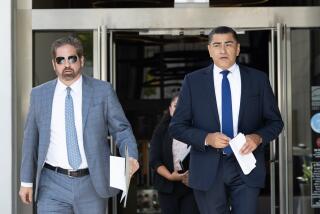Evidence at Issue in Misconduct Case : Hearing: Prosecutor seeks to allow introduction of battering ram. The defense claims it was seized during an illegal search.
- Share via
A Los Angeles police officer who “lied and admitted lying; concealed evidence and admitted concealing evidence,” now is making matters worse by “coming into court and complaining his rights have been violated,” a prosecutor in the “39th and Dalton” police misconduct case asserted Monday.
Deputy Dist. Atty. Christopher Darden made the remarks in final arguments of a hearing to determine if a judge should allow a key piece of evidence--a battering ram--to be used in the trial of Officer Charles Wilson and three colleagues accused of vandalizing four residences during a raid two years ago. Prosecutors say the ram is the strongest evidence linking police to the damage.
Wilson has acknowledged making the ram, and no one disputes that it was used during the raid. Wilson’s testimony during the current hearing cannot be used against him at trial.
Darden was opposing a contention by Wilson’s lawyer, Paul R. DePasquale, that the ram was illegally seized and therefore should not be used as evidence.
DePasquale said that no matter in whose favor Municipal Judge Larry Paul Fidler rules, the decision will be significant.
“Neither side is going to take this lying down,” DePasquale said. “Since there are very few cases that deal with these issues (police officers’ rights), this one has a good chance of making the books.”
Fidler said he expects to make the ruling today. At issue is whether internal affairs investigators and Wilson’s commanding officer acted properly in getting Wilson to retrieve the homemade, red-painted metal ram from a storm drain in South Los Angeles, where it had been stowed after the raid.
DePasquale contended that the commander, Enrique Hernandez, should have advised Wilson of his rights when he took Wilson aside for a private conversation at Wilson’s home after the officer admittedly lied about the ram’s whereabouts. That is required when an officer is the subject of an internal investigation or is under arrest in a criminal investigation, DePasquale said. He further contended that Wilson was under police custody and that the investigators coerced him into cooperating.
Darden argued that a criminal investigation, not an internal one, was being conducted during the search and that Wilson was not being held. Hernandez’s testimony last week that investigators had entered a deal with Wilson, Darden argued, is “biased” and should be ignored because Hernandez now works in the firm of a lawyer who represents one of Wilson’s co-defendants.
The Aug. 1, 1988, raid in the 3900 block of Dalton Avenue involved 80 officers who went to four apartments with warrants to search for drugs. The occupants later complained that officers virtually destroyed the interiors of the dwellings and their contents.
Charges of misdemeanor vandalism and conspiracy to commit vandalism were later filed against Wilson, Capt. Thomas D. Elfmont, Sgt. Charles (Ted) Spicer and Officer Todd Parrick.
More to Read
Sign up for Essential California
The most important California stories and recommendations in your inbox every morning.
You may occasionally receive promotional content from the Los Angeles Times.













